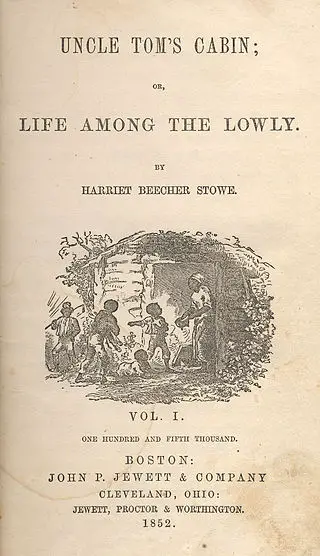Literature about Slavery
Slavery between 1850 and 1880
As the various states played their various roles trying to promote that slavery was a marvelous thing, few in the rest of the country knew any details about slaves and their lives.
Abolitionists used the written word to get information out so that people realized the horrors of slavery and getting rid of the lies that the pro-slavery groups were spreading.
Many of the books written were by those that had been slaves. These determined individuals were often self-taught and wanted to get the stories out to help to influence public opinion. The literature written about slavery made an incredible effect of spreading information about the suffering of the oppressed slaves and letting them and others fight against this kind of discrimination.
- Uncle Tom’s Cabin (also known as Life Among the Lowly) (1851-1852); Harriet Beecher Stowe, author. This is probably the most well-known book from pre-Civil Wartime and had the biggest impact on the public. Its publication included the details of what life was like for the slaves, and some have listed Stowe’s book as a major reason for the Civil War. Before the book was published, few people in non-slave states were aware of the incredible horrors of slavery. As an abolitionist, Stowe included details that were considered to be controversial. This book had the most impact on the abolition fight during the time.

- Narrative of the Life of Frederick Douglass, an American Slave (1845); Frederick Douglass, author. The tale that Douglass told in his autobiography was a harsh reality of the sufferings of slaves in the pre-Civil War time. Douglass tells that he, like almost all slaves, didn’t know who his father was and was separated from his mother. He relates the many ways that slaves were harmed and used on the plantations. When he moved to the city to a new owner, Douglass recognized that city slave received slightly better treatment, and it was during that time that started his education. As an abolitionist, Douglass’ book let the rest of the world know how awful things were. He spent part of his life traveling and lecturing and also served during the Civil War as President Lincoln’s aide.
- Appeal to the Colored Citizens of the World…(1829); David Walker, author. This book was sold to sailors that were traveling to the southern states. It was considered to be a publication that the slave owners feared, and they were outraged at its contents. Walker included the statements that slaves should rise and fight against slave owners and that since the slaves had built more of the country than white people, America belonged more to them. The language in the book was thought to be violent and caused legislation to be put in place to outlaw slaves from being able to write or read. The book was radical for its day and is believed to be the likely reason that Walker was poisoned. The ultimate use of the book continued and was an inspiration to slaves that wanted to fight against slavery.
- Narrative of William W. Brown, a Fugitive Slave (1847) William Wells Brown, author. Brown’s autobiography was popular almost immediately after its first publication. It became so well-liked that it was the second most popular of slavery. The book exposed the ugliness of slavery, and the hardships that mixed-race people such as himself had to go through. His father had been a white man, and his mother was a slave. The details in the book detailed the horrible treatment of slaves and showed that the institution pushed slaves to extremes just to survive. One of the most important aspects of his book included calling the so-called “Christians” that were slave-owners as they mistreated slaves and treated fellow human beings so badly. Once Brown was freed, he was acclaimed for his book and went on overseas tours. Brown became the first African American to successfully publish a novel, play, and a book on travel.
Q&A:
What is the book about slavery that was considered to be the most outrageous due to encouraging slaves to rise and fight?
Appeal to the Colored Citizens of the World
What was the name of the author that wrote the book credited with possibly prompting the Civil War?
Harriet Beecher Stowe
Which author included in his book the hardships that mixed-race people had to go through?
William Wells Brown
Why were the abolitionist books important for the pre-Civil War society?
The books got information out so that people realized the horrors of slavery and getting rid of the lies that the pro-slavery groups were spreading
What is the most well-known of all of the pre-Civil War era books on slavery?
Uncle Tom’s Cabin
What special credits did William Wells Brown hold?
The first African American to successfully publish a novel, play and a book on travel



